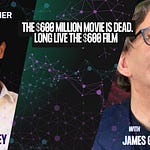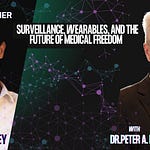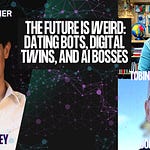In this episode of The AI Philosopher, I sit down with Luca Csathy, a freshly minted graduate from NYU’s film program, to get a Gen Z perspective on something I’ve been observing with growing urgency: AI isn’t just changing how we work—it’s changing who we are.
Luca’s background spans filmmaking, editing, and writing, but what struck me most was his clear-eyed view of how generative AI is transforming creative industries. He explained how technologies like virtual sound stages and prompt-based video generation are already replacing traditional film roles. Coding and prompting are becoming as important—if not more so—than traditional on-set skills. While the high-art side of filmmaking may endure, the commercial sector is clearly shifting.
But the real jaw-dropper?
When I asked Luca if students today are using AI in school, he didn’t hesitate: “Everyone is.” From film students to English majors, ChatGPT has become the go-to shortcut. Students use it not just to speed up research or clean up grammar, but to generate entire papers and creative projects. It’s fast, efficient—and quietly devastating.
What’s being lost, Luca told me, is the student’s own voice. They’re not developing critical thinking or learning how to articulate their ideas. Instead, they’re outsourcing their brains to a machine. That process—wrestling with language, clarifying thoughts, building an argument—was always the point of higher education. If we skip it, what are we really learning?
Even more troubling, Luca noted that this over-reliance on AI is damaging students’ creative confidence. Many are so surrounded by algorithmic perfection—or what looks like it—that they lose faith in their own ideas before they’ve even begun. They stop before they start. And that’s not just an academic problem; it’s a cultural one.
Despite the bleak outlook, Luca remains hopeful. He’s using AI in thoughtful, limited ways—more like an assistant than a replacement—and he’s actively collaborating with other creatives to produce original work. He even sees a kind of resistance building: young people returning to the “greats” in cinema, watching films with fresh eyes and seeking inspiration the old-fashioned way.
Our conversation reminded me of something I’ve long believed: technology can’t replace the human soul. AI may generate content at scale, but humans create art through struggle, emotion, and meaning. And while students today are inundated with tools to help them “hack” their way through life, many are still hungry for depth.
As Luca put it, the challenge now isn’t whether AI will change the world—it already has. The real question is how we respond. Will we lean into convenience and lose our creative muscles? Or will we reclaim the hard, messy, human work of making things that matter?
We still have a choice. But the clock is ticking.









